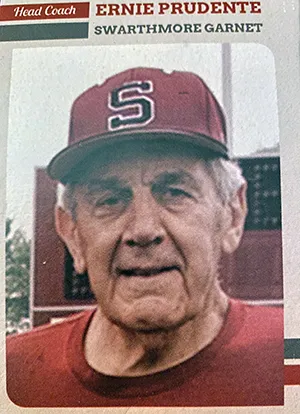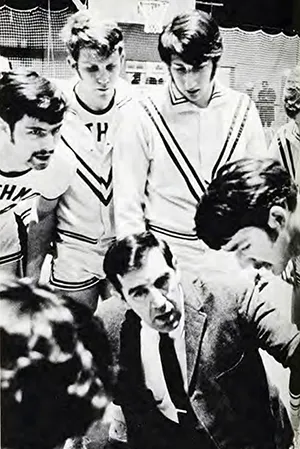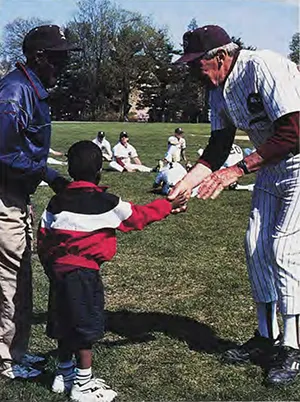In Honor of Longtime Coach and Professor Ernie Prudente

In 2017, Ernie and his wife Matilda cut the ribbon for the refurbished press box at Clothier Baseball Field, which is named in his honor. Attendees at the ceremony also received this baseball card to commemorate the occasion.
President Valerie Smith shared the following message with the campus community on April 21, 2020:
Dear Friends,
With deep sadness, I write to share the news that longtime multisport head coach and Professor Emeritus of Physical Education Ernest J. Prudente died peacefully last Tuesday while in hospice care in Wallingford, Pa. He was 92.
Ernie is remembered as a dedicated coach and mentor whose focus on enjoying the effort in sports as much as on win-loss records inspired generations of students, on the field and off.
Ernie is survived by his wife of 62 years, Matilda, their four children, and nine grandchildren. A celebration of his life will take place when it is safe to do so.
I invite you to read more below about Ernie and his many contributions to our community.
Sincerely,
Val Smith
President
In Honor of Longtime Coach and Professor Ernie Prudente
Synonymous for many years with Swarthmore College, beloved longtime head coach Ernie Prudente died Tuesday, April 14, at age 92.
After 27 years of service at the College, and an additional three decades in retirement consistently cheering on the Garnet from the stands, Prudente is remembered as a Swarthmore institution. The winningest head baseball coach in Garnet history, Prudente also coached basketball for a time, assisted with coaching the football team, and invigorated the College’s intramural sports program.
“Ernie had a profound impact on his students, this department, and the entire community,” says Adam Hertz, Marian Ware Director of Athletics. “As a coach, professor, husband, father, mentor, and friend, he positively influenced innumerable people. His impact on Garnet athletics cannot be overstated and will not be forgotten.”
“He had so many wins, but his biggest accomplishments lie in the hearts of those who had the honor to suit up for him,” says head baseball coach Matt Midkiff. “When Ernie was surrounded by his former players, they still looked at him with reverence and hung on every word as he spoke, even all these years after they graduated.”
Prudente was born and raised in Ardmore, Pa., by Italian immigrant parents; his mother lived to 100 without ever learning English. The youngest of five, he loved all sports as a child and played baseball, basketball, and football at Haverford High School. He also spent many afternoons cutting grass for his father’s landscaping business.
Drafted before he could graduate, Prudente served in the U.S. Navy Reserve on the USS Oregon City. After he was discharged in 1946, he played football at Friends’ Central School, prompted by an earlier conversation with Swarthmore All-American football player Wilmer Crowell, Class of 1905, a well-known area coach and referee.
“If it weren’t for football, I’d never have gone to college,” Prudente told The Phoenix in 1995. At the University of Pennsylvania, he earned a B.S. and an M.S. in education, graduating in 1951. He was also a standout athlete in basketball and football, and was a lineman at a time when athletes played both ends of the field and Penn’s team was one of the most celebrated in the country. Over the years, Prudente remained a fixture at Penn football games and helped organize his 65th class reunion.
Prudente continued to play sports after college, including for the semi-professional Main Line League and the Penn-Del League at the same time. He also worked behind the scenes to raise money, apply for field permits, and take care of the equipment and uniforms.

Coaching at home against friends from Haverford in 1970.
After Penn, Prudente coached basketball, baseball, and football at Haverford College for 17 years. In fall 1969, he came to Swarthmore as an associate professor of physical education and to serve as head basketball and baseball coach and as a line coach for the football team.
On the hardwood, Prudente led the Garnet to its first winning season in 18 years and claimed eight consecutive victories over rival Haverford. Perhaps more significant than the wins was the new outlook he was credited with bringing to the team. A coach’s primary job, he believed, was to keep things fun. He also said there could be no fear of making mistakes, because “for every shot you miss, you’re that much closer to making the next one.”
Coupled with his quick-to-praise, slow-to-blame approach, Prudente inspired the basketball team to regain their confidence and develop a winning attitude. In 12 seasons, he compiled 81 wins, the third-most in program history.
On the baseball diamond, his teams also enjoyed continual success. However, no squad was more accomplished than the 1985 team, which finished with a 27–6 record and made the program’s first appearance in the NCAA Tournament. For his efforts during that dream season, Prudente was named the Mid-Atlantic Conference Southern Division Baseball Coach of the Year.
Prudente inspired devotion among his players in other ways. At a time when players with long hair were often considered “discipline” problems, Prudente took the opposite view; although himself not a fan of beards and long hair, he said, “My rule is that if you can look in the mirror and like what you see, then it’s all right with me.”
Prudente also had a legendary sense of humor, regaling players with stories on bus trips, in the locker room, and during halftime pep talks. The authors of the 1977 April Fools’ edition of The Phoenix returned the favor, “quoting” him saying he was leaving Swarthmore for national basketball powerhouse UCLA: “I really loved it here at Swarthmore, but I’ve always wanted to coach someone over 6’6”, so I’m movin’ on.”
Throughout his teams’ successes, Prudente refused to accept much credit, saying that “coaching is only about 10% of the game.” Instead, he took more pride in the success of Swarthmore graduates and rarely forgot a former player.

At his last game as baseball coach in April 1995, the community turned out to wish him many extra innings.
In fall 1981, Prudente volunteered to take on oversight of the intramural sports program, which had previously been run solely by students. To the core sports of softball, volleyball, and basketball, he added indoor and outdoor soccer, JV baseball, tennis, squash, miniature golf, water polo, and badminton, depending on student interest and suggestions in any given year.
Under Prudente’s management, enrollment in intramural sports soared above 600 students, almost half of the student body at the time. He also opened participation up to faculty and staff members, prompting various academic and administrative departments to field teams. As a result, softball once had 28 teams; in 1988, volleyball was the most popular with 15, and in 1995, basketball was the largest with 18 teams.
Underpinning all of his efforts was Prudente’s belief that sports encouraged students to have fun and make friends, while providing an outlet from academic pressures and opportunities to develop leadership skills. Not surprisingly, The Phoenix dubbed him Ernie “I.M. Sport” Prudente.
By 1987, Prudente was exclusively coaching baseball and was a newly elected member of Penn’s Football Hall of Fame. That May, he was named to the Delaware County Sports Hall of Fame in recognition of his lifelong involvement in the area.
In 1992, Prudente became a full professor of physical education. Upon his retirement from coaching baseball in 1995, he had amassed a program-best 216 wins. The Phoenix made clear his successor had “very large shoes to fill (size 14, in fact).”
Although no longer coaching, Prudente maintained a steady presence on campus, especially at spring baseball games. He is the eponym for the Athletics Department’s award, established when he retired, that is given annually to the male and female athletes who demonstrate the characteristics he exemplified: sportsmanship, love of the sport, and respect for their teammates.
In 2015, Prudente was inducted into the Garnet Athletics Hall of Fame. The refurbished press box at Clothier Baseball Field is also named in his honor; at the 2017 dedication ceremony, he and Matilda cut the ribbon. Attendees received an Ernie Prudente baseball card.
“Swarthmore College is my second home,” Prudente said at the time. “I liked coaching there, and I think all colleges should be like Swarthmore.”
Over the years, Prudente often offered his approach to sports, which in 1971 took this form: “If you can’t have fun playing, you might as well not play at all.” His added corollary: “Winning is the most fun.



